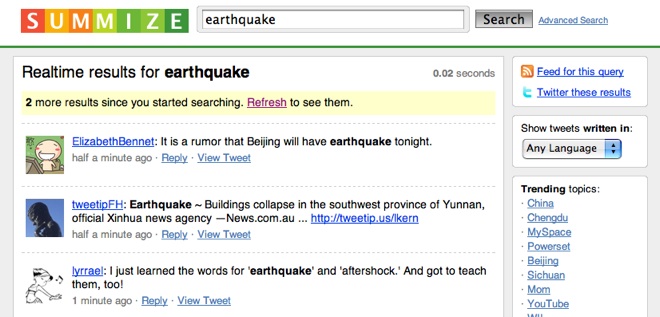 Tonight, a lot of us who are regular users of the micro-messaging service Twitter witnessed something pretty amazing. A 7.8 magnitude struck China and the news unfolded before our eyes on Twitter. Before it was on CNN, before MSNBC, before the BBC, even before the United States Geological Survey (which handles earthquake data) had the information, Twitter was on it. How? Its users.
Tonight, a lot of us who are regular users of the micro-messaging service Twitter witnessed something pretty amazing. A 7.8 magnitude struck China and the news unfolded before our eyes on Twitter. Before it was on CNN, before MSNBC, before the BBC, even before the United States Geological Survey (which handles earthquake data) had the information, Twitter was on it. How? Its users.
While the mainstream media scrambled to put up their “breaking news” headlines, on Twitter we had pictures, maps, videos all being sent in real-time.
Twitter first responder (and sometimes blogger), Robert Scoble was on the news into the early hours of the morning, transferring news from the 21,185 people he follows to the 23,200 people following him. In turn, many of those folks would re-tweet (the term used to describe a message being re-sent out) the news to their followers. Information spread like wildfire on the service.
A quick glance at the truly awesome Twitter search site Summize (pictured below) with a query of the term “earthquake” was even more interesting and informative.

We’ve seen this before. Last year, several smaller earthquakes were reported first on Twitter. The mainstream media largely ignored this fact, but it happened nonetheless. Now, with so many people thinking about Twitter valuations, and whining about Twitter not being mainstream, the service is starting to garner attention for the wrong reasons. At the end of the day, what difference does it make if it’s mainstream or not? It’s very useful for situations like this, and it’s actually helping people. We saw that during the San Diego fires last year as well.
Today’s event are already causing some in the mainstream media to reconsider their stances on the service. Rory Cellan-Jones with the BBC, writes today:
I was beginning to think Twitter – the micro-blogging service that’s all the rage amongst the technorati – was just another fad for people who want to share too much of their rather dull lives. Until this morning.
This event along with news such as the American student who was arrested in Egypt but set free thanks to Twitter, are propelling the service into the spotlight. Whether that in turn propels it into mainstream usage, we’ll see. But again, does that really matter? Twitter will continue to be useful with or without the approval of the masses.
You can find me on Twitter here along with fellow VentureBeat writers Eric Eldon, Dean Takahashi, Anthony Ha and Chris Morrison. Oh, and we have a VentureBeat account (for our posts) as well.

